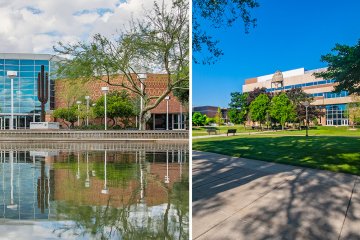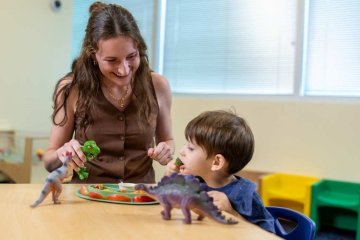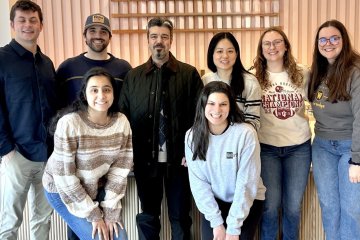Occupational Therapy Students Showcase a Multitude of Capstone Projects
Projects emphasize patient care, increased quality of life
- IL - Downers Grove
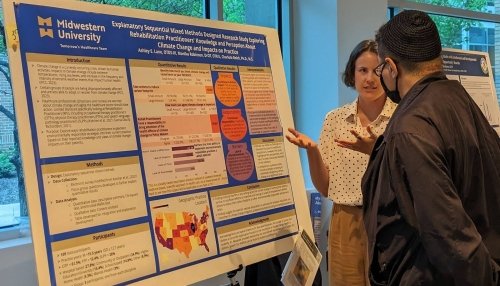
Ashley Lane (CHS-Downers Grove OT ’24) describes her project Explanatory Sequential Mixed Methods Designed Research Study Exploring Rehabilitating Practitioners’ Knowledge and Perception About Climate Change and the Impacts on Practice. Ashley also won Outstanding Poster Presentation at the Kenneth A. Suarez Research Day.
Doctoral students graduating from the Occupational Therapy (OT) program in the College of Health Sciences, Downers Grove (CHS-DG) at Midwestern University presented their final capstone projects in an event held on campus. Cardinal Hall was lined with 46 Capstone posters and students eager to describe their projects as their days in academia drew to a close.
Several students from the Occupational Therapy Class of 2024 were excited to share information about their projects:
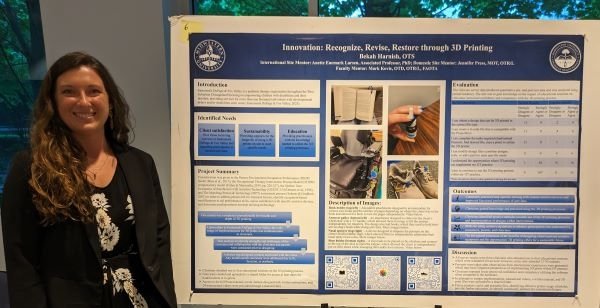
For Bekah Harnish, her project involved a month of time abroad in Denmark to study the 3D printing process there and apply the methods here. As part of her project, Bekah collaborated with the Easterseals DuPage & Fox Valley agency on possibilities for different clients. Her poster highlighted cases where 3D printing assisted patients with devices with 3D-printed devices that were specifically tailored to the patients’ requirements, such as attachments to assist a patient turn pages of a book without assistance, use nasal spray without help, pull up an arm rest in a wheelchair, and a clip to put their shoes on. “I think learning 3D printing is very manageable. I would love to do this as a consultant for different clients and increase their quality of life,” Bekah said.
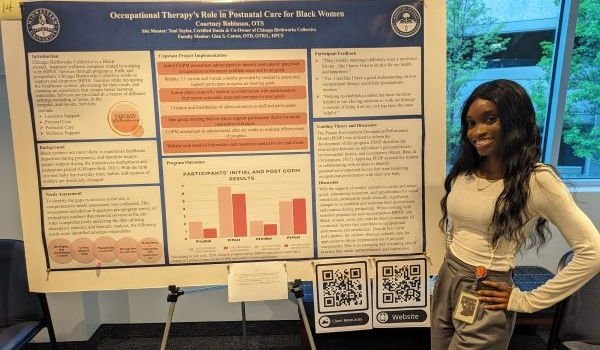
Courtney Robinson examined ways occupational therapists could assist postpartum Black, indigenous, and people of color (BIPOC) women as they figure out their routines, daily activities, and roles following birth. She worked with Chicago Birthworks Collective, a maternal wellness company dedicated to assisting BIPOC women through a variety of services including wellness support, prenatal and postnatal care, and lactation support. “I would like people to know this is a vulnerable area that needs more attention. They are facing disparities,” Courtney shared.
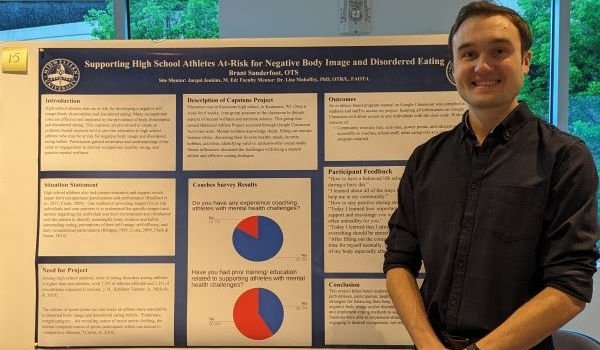
Brant Sanderfoot developed a program to support high school athletes who may be at risk of developing a negative body image along with disordered eating. Brant spent his doctoral capstone at Kaukauna High School in Kaukauna, WI, where he conducted group sessions about nutrition science and mental wellness. “The current stigma is that athletes don’t need mental health support,” Brant said. He added that the athletes usually have a circle of friends and are physically fit, and the misconception is that the athletes have everything going for them compared to other student groups and are overlooked. Brant showed the students how to balance their schedules, keep a positive outlook, manage stress, and advised them about positive body image and healthy eating.
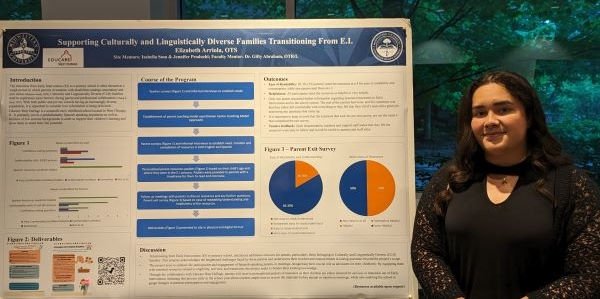
Elizabeth Arriola focused on creating resources in Spanish and English for families of children receiving early intervention services. Elizabeth said that at meetings, parents and guardians could hear technical jargon and not fully comprehend what is going on, and often the translation they receive is word for word and the true meaning is lost. Parents and guardians could be uncomfortable asking questions or sharing their opinions. “It’s extremely important to keep the parents comfortable in expressing themselves and bring invested in the overall process.”
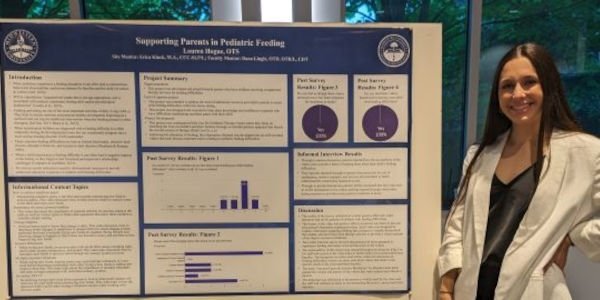
Lauren Hogue created video resources for parents with children who have pediatric feeding disorders. She received positive feedback from families who utilized the videos. “It’s really important when dealing with children to maximize mealtime peace,” Lauren said.
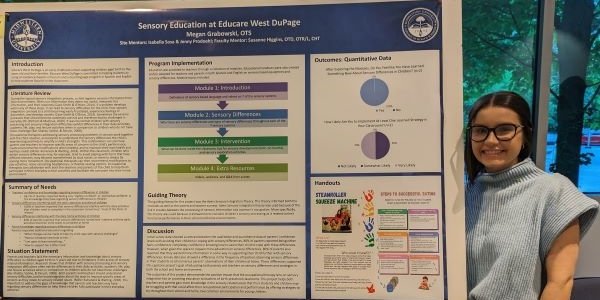
Megan Grabowski worked with Educare West DuPage, an early childhood school, on sensory education and discussed resources and methods for children with difficulties processing sensory information. “All children have different ways to learn for sensory information,” Megan said. As an example, she stated that in the past, children who moved a lot may have been erroneously termed as misbehaving, but now it is understood that those children require more input to regulate themselves.
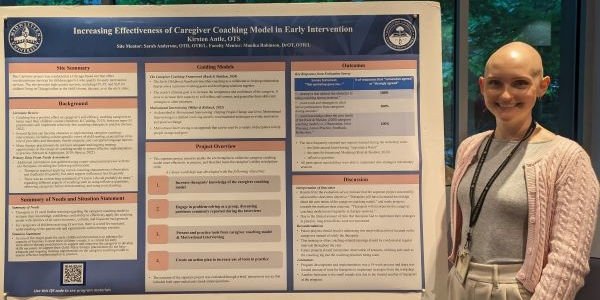
Kirsten Antle utilized the caregiver coaching model for early intervention. Kirsten shared, “Coaching has been known as a best practice early intervention. My project is aimed to help therapists use more coaching.” Kirsten elaborated further on how the caregiver can assist. “Instead of me telling the parent or guardian what to do, we brainstorm together,” she said. Subsequently, Kirsten would ask the parent or guardian to carry out the discussed ideas and ask the parents reflective questions about what worked and what did not. Kirsten reflected, “I would like people to know that evidence shows that the caregiver community model is effective.”
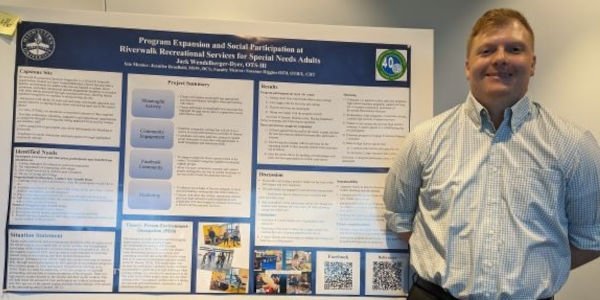
Jack Wendelberger-Dyer worked with Riverwalk Recreational Services in Naperville on a program development project aimed at participation and social interaction for adults with intellectual and developmental disabilities. “The biggest takeaway from this experience was everything I learned while working with this population.” Jack stated he also spent time learning more about the process of marketing the program.
Capstone projects offer Occupational Therapy students the chance to expand upon their classroom learning and develop programs for the community to increase the quality of life for a variety of people. During the doctoral capstone process, students have the opportunity to obtain in-depth knowledge of a subject area and practice scholarship, which gives students more experience upon beginning their careers. As the students begin the next phase of their careers, they will take along the knowledge they gained during their capstone experience and their education at Midwestern University.

